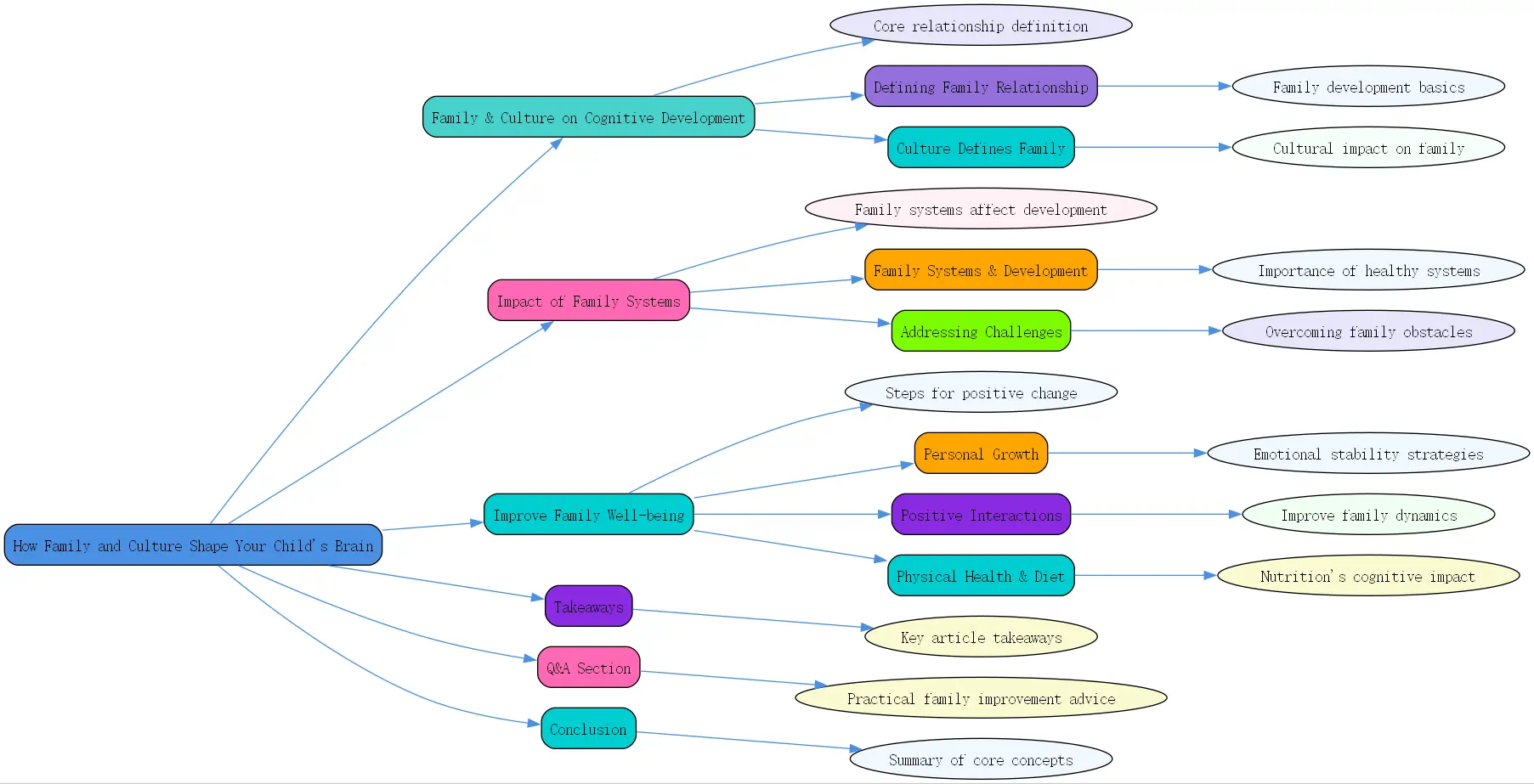Understanding the Relationship Between Family and Culture on Cognitive Development

Family and culture are two fundamental forces that shape a child’s mind. The relationship between family and culture on cognitive development is complex and profound, influencing how children think, learn, and grow. Let’s break it down.
Defining Family Relationship Development
Family relationship development refers to how bonds and interactions within a family evolve over time. It’s about the emotional connections, communication patterns, and support systems that form between parents, children, and siblings. This development isn’t static—it shifts as families grow, face challenges, and adapt to life’s changes.
Early family dynamics play a massive role in cognitive skills. Positive interactions—like storytelling, play, or problem-solving together—boost language acquisition and critical thinking. A child who feels secure and heard is more likely to explore ideas and express curiosity. But if those early relationships are strained or distant, it can hinder emotional intelligence and focus. Research backs this up: supportive families lay the groundwork for sharper minds.
How Culture Defines Family Relationship
Culture acts like a blueprint for family life. It dictates how families are structured and how they interact. In Western societies, nuclear families—mom, dad, kids—are common. In contrast, many Eastern cultures embrace extended families, with grandparents and cousins under one roof. These differences matter.
How culture defines family relationships shows up in everyday norms. In collectivist cultures, like those in Asia or Africa, family decisions might prioritize the group, teaching kids cooperation and social awareness. Individualistic cultures, like in the U.S., often emphasize independence, shaping self-reliance in children. The family relationship culture definition varies globally—it’s the shared values and practices that guide family roles and expectations.
These cultural lenses affect cognitive growth. Kids in interdependent families might excel at teamwork and empathy, while those in independent setups might shine in solo problem-solving. Understanding this helps parents see how their cultural context molds their child’s brain.
The Impact of Family Systems on Healthy Development
Stable families are a launchpad for thriving kids. Let’s explore how family systems tie into cognitive health and what happens when challenges arise.
The Relationship Between Family Systems and Healthy Development
The relationship between family systems and healthy development is clear: stability breeds success. Studies show kids from consistent, nurturing homes score higher on IQ tests and do better in school. Why? Supportive family dynamics spark intellectual curiosity. When kids feel safe to ask questions or fail without judgment, their brains light up with new connections.
Think of a family as a child’s first classroom. Parents who encourage exploration—reading together, discussing ideas, or tackling puzzles—build a foundation for learning. Emotional support also matters. A child who trusts their family to catch them when they fall is freer to take cognitive risks, like trying a tricky math problem or writing a story.

Addressing Challenges in Family Relationships
Not every family is a smooth ride. Conflict, stress, or neglect can throw a wrench into cognitive growth. Kids under chronic stress might struggle with memory or attention—stress hormones literally shrink brain areas like the hippocampus. It’s a tough cycle: family tension fuels anxiety, which clouds thinking.
But there’s hope. Self-awareness is a game-changer. Parents can model calm by practicing mindfulness, creating a ripple effect of peace. External support, like family therapy, can also rebuild communication and trust. For deeper tools, check out books on anxiety management from BrainTalking—they offer practical ways to ease family stress and boost well-being.
Practical Steps to Improve Family Well-being and Cognitive Function
Want to strengthen your family and sharpen your kids’ minds? Here are actionable steps grounded in psychology and science.

Strategies for Personal Growth and Emotional Stability
First up: self-authoring. This technique involves writing about unresolved past experiences. It’s simple but powerful—putting pen to paper helps process old baggage, lowering stress. Less stress means clearer thinking for both parents and kids. Studies suggest it reduces the mental load that drags down cognitive function.
Next, embrace conscientious conduct. Organized, hardworking people tend to feel less negative emotion. Keep your home tidy, stick to routines, and set goals as a family. Kids pick up these habits, learning discipline and focus—key ingredients for cognitive growth. A stable environment signals safety, letting their brains thrive.
Fostering Positive Family Interactions
Shift your focus outward. Instead of dwelling on personal worries, think about how to lift up your family. Small acts—like helping with homework or cooking together—build connection and cut anxiety. It’s a paradox: serving others lightens your own load.
Facing fears as a family is another win. List what’s holding you back—maybe it’s a child’s school anxiety or a parent’s work stress. Break it into steps: talk it out, plan a solution, act. Gradual exposure builds resilience. A kid who overcomes fear of failure, for instance, gains confidence that spills into learning.
Considering Physical Health and Diet
Don’t sleep on the body-mind link. Physical health and diet directly affect cognition and mood. Inflammation—sometimes from poor diet—can fuel anxiety, clouding a child’s focus. Emerging research points to ketogenic or carnivorous diets as mood-lifters for some. These diets cut carbs, stabilize energy, and may reduce brain fog.
Not ready for a big shift? Start small: swap sugary snacks for whole foods. Exercise together—walks or games boost endorphins and sharpen thinking. Healthier bodies mean happier, more focused minds. Consult a doctor to tailor this to your family, but the evidence is growing: what you eat shapes how you think.
Takeaways

- The relationship between family and culture on cognitive development drives how kids learn and grow.
- Stable family systems spark curiosity and resilience, while stress can stall progress.
- Self-authoring and conscientious habits reduce stress, boosting family well-being and cognition.
- Serving others and facing fears together strengthen bonds and mental clarity.
- Diet and exercise aren’t just physical—they’re cognitive power-ups.
Q&A Section
Q: How can I improve my family’s cognitive development?
A: Start with a nurturing environment. Open communication—talking about feelings or ideas—builds trust and curiosity. Offer learning opportunities, like books or puzzles, and model problem-solving. Diet and exercise matter too—cut junk food, move more. For stress, try self-authoring: write about past struggles to clear mental clutter. Therapy or resources like BrainTalking’s books on anxiety management can help. It’s about balance: emotional support, healthy habits, and a little cultural awareness.
Conclusion
The relationship between family and culture on cognitive development is a dance of influence. Families provide the emotional soil—nurturing or rocky—while culture shapes the rules of engagement. Together, they mold how kids process the world. Practical steps like self-authoring, serving each other, and eating smarter can transform your home into a cognitive powerhouse.



